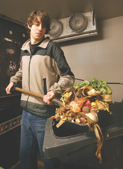It's not easy being green
Where does McGill stand on an environmentally sustainable future?

Gorilla Composting co-founder Kaelan Gell with a shovelful of vegetable matter to turn into fertilizer gold.
Owen Egan
The fate of the environment has become a common concern. Waste management, sustainable development, clean water, clean air are all topics that have entered the public discourse, and universities have long been looked to as leaders in environmentally conscious policies. Accordingly McGill has steadily been taking steps toward a greener campus.
Some say the university's current initiatives are too timid; to others, McGill is doing everything it can in a difficult political climate. McGill Environmental Officer Kathleen Ng describes the situation imposed by tight purse strings and apathy. "The federal and municipal governments have been quite slow to pursue the environmental goals laid out almost 20 years ago. Funding is tight at McGill and with an underdeveloped bureaucratic infrastructure on a provincial level we occasionally have to make some hard decisions."
When the Senate Committee on Physical Development met November 24 to decide on McGill's environmental agenda, many green policies were passed, though many larger incentives were left to languish for at least another year. A plan to install new recycling bins at regular intervals in every hallway and in elevator bays has been trashed because Quebec couldn't provide funding. McGill's upstart heroes of waste management, Gorilla Composting, received a tenth of the funding they had requested. The AlléGo Program, a new car-pooling and campus transport program was shelved pending further research.
To get a better grasp of the enviro debate at McGill, here are a few of the more salient issues that were discussed at the November meeting.
WASTE MANAGEMENT: "Gorilla Composting is a play on guerilla tactics — we could see that there was no standard process for making McGill environmentally accountable." That's how Gorilla Composting co-founder Danny Spitzberg sums up their inspiration for the name. Founded earlier this year by Spitzberg, U3 Environmental Science, and Kaelan Gell, U3 Civil Engineering and Applied Mechanics, team Gorilla is dedicated to waste management as a shared responsibility of students and staff. Their goal is nothing short of implementing a campus-wide composting infrastructure with appropriate facilities for that scale. But the university has yet to make a long-term financial commitment — the students were seeking $85,000 but will have to do with the $16,000 allotted by the administration.
Kathleen Ng is a big believer in the necessity and feasibility of urban composting. She is happy that Gorilla has taken the initiative to get the program off the ground. However, due to a restrictive budget, she echoes the administration's need for caution. "Gorilla Composting is a great idea and they worked really hard on the project. But the project needs a coherent management structure. For example, when the organizers leave there is no plan for continuity. Nothing gets the green light until they get a coherent proposal." Spitzberg and Kealan disagree. They claim that they have taken care to design a sound and sustainable proposal that has been well researched and carefully thought out. "McGill has simply neglected the opportunity to be a leader on the island of Montreal," says Spitzberg. To see their plan, go to www.gorilla.mcgill.ca
ALLÉGO: In an attempt to encourage responsible fuel consumption and to reduce emissions, McGill signed on as a participant in the AlléGo program. McGill has been working on transportation demand management for both its downtown and Macdonald campuses to reduce the number of commuters arriving in single occupancy vehicles. A great idea, but not yet ratified, as the Senate Committee did not get to a vote on the issue. The project is scheduled for review in January.
CLEAN & GREEN PROJECT: Under this program, the university provides removal of unwanted equipment and other bulky items from campus. Last year the program removed 1.6 tonnes of unwanted equipment. In 2005, over 55 metric tonnes of material were picked up from both campuses, of which 87 percent was re-used or recycled instead of being dumped as landfill. The successful program will continue. The university will hold these cleanups twice a year to allow departments to make better use of limited space by eliminating clutter.
RECTO-VERSO PAPER USE POLICY: The Recto-Verso project, originally spearheaded by students, resulted in the development of a proposed paper use policy that has recently been approved by the Board of Governors. McGill Printing and the student group Caring About Resources in Engineering produce scratch pads from one-side use paper. The Macdonald Campus Students` Society also purchased bins strategically placed where the public can deposit non-confidential one-side-use paper to be used as scratch paper. Using 30 per cent post-consumer stock, the program is slated to cut paper use by thousands of sheets per semester.
BIKE FLEET/BIKE RACKS: To encourage the community to consider more efficient, eco-friendly means of transportation across campus, Macdonald Campus has implemented the best-performing bike loan system in the province for two consecutive years. The number of loans has more than doubled since the program's debut in 2003, from an initial 700 to more than 1,500 in 2004. Also in fall 2006, 20 new bike racks will be installed on the downtown campus capable of holding up to 90 bicycles.
To find out more about green campus initiatives, go to www.mcgill.ca/rethink/initiatives

